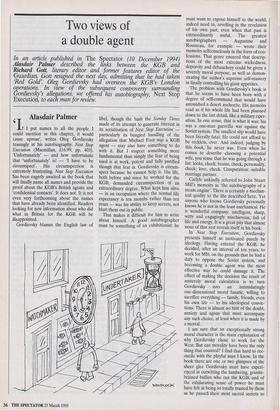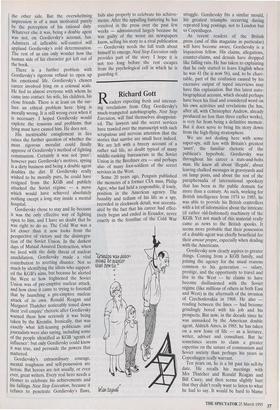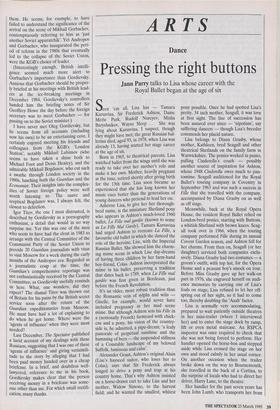Two views of a double agent
In an article published in The Spectator (10 December 1994) Alasdair Palmer described the links between the KGB and Richard Gott, literary editor and former features editor of the Guardian. Gott resigned the next day, admitting that he had taken `Red Gold'. Oleg Gordievsky had overseen the KGB's London operations. In view of the subsequent controversy surrounding Gordievsky's allegations, we offered his autobiography, Next Stop Execution, to each man for review.
Alasdair Palmer
If I put names to all the people I could mention in this chapter, it would cause uproar', writes Oleg Gordievsky teasingly in his autobiography, Next Stop Execution (Macmillan, £16.99, pp. 403). `Unfortunately' — and how unfortunate that 'unfortunately' is! — have to be circumspect'. His circumspection is extremely frustrating. Next Stop Execution has been eagerly awaited as the book that will finally name all names and provide the proof about the KGB's British agents and `confidential contacts'. It does not. It is not even very forthcoming about the names that have already been identified. Readers looking for new information about who did what in Britain for the KGB will be disappointed. Gordievsky blames the English law of libel, though the hash the Sunday Times made of its attempt to generate interest in its serialisation of Next Stop Execution particularly its bungled handling of the allegation that Michael Foot was a KGB agent — may also have something to do with it. But I suspect something more fundamental than simply the fear of being sued is at work, potent and fully justified though that fear is. Gordievsky is circum- spect because he cannot help it. His life, both before and since he worked for the KGB, demanded circumspection of an extraordinary degree. What kept him alive — in an occupation where the normal life expectancy is ten months rather than ten years — was his ability to keep secrets, not blurt them out in public. That makes it difficult for him to write about himself. A good autobiographer must be something of an exhibitionist: he must want to expose himself to the world, indeed need to, revelling in the revelation of his own past, even when that past is extraordinarily sinful. The greatest autobiographers — Augustine and Rousseau, for example — wrote their memoirs selfconsciously in the form of con- fessions. That genre ensured that descrip- tions of the most extreme wickedness, depravity and debauchery could be given a severely moral purpose, as well as demon- strating the author's supreme self-mastery in finally controlling his giant appetites. The problem with Gordievsky's book is that he seems to have been born with a degree of self-command that would have astonished a desert anchorite. His memoirs read as if his whole life had been planned down to the last detail, like a military oper- ation. In one sense, that is what it was: his was a one-man guerrilla war against the Soviet system. The smallest slip would have been literally fatal. He could not afford to be reckless, ever. And indeed, judging by this book, he never was. Even when he comes to describe choosing a potential wife, you sense that he was going through a list: looks, check; brains, check; personality, check; love, check. Computation: suitable marriage partner. Carlyle unkindly referred to John Stuart Mill's memoirs as the autobiography of a steam engine'. There is certainly a mechan- ical quality to the life described here. Yet anyone who knows Gordievsky personally knows he is not in the least mechanical. He is wonderful company: intelligent, sharp, witty and engagingly mischievous, full of life and energy. It is a great pity that almost none of that zest reveals itself in his book. In Next Stop Execution, Gordievsky presents himself as motivated purely by ideology. Having entered the KGB, he decided, after an interval of ten years, to work for MI6, on the grounds that he had a duty to oppose the Soviet system, and becoming a double agent was the most effective way he could damage it. The effect of making the decision the result of austerely moral calculation is to turn Gordievsky into an intimidatingly one-dimensional moral fanatic, willing to sacrifice everything — family, friends, even his own life — to his ideological convic- tions. There is almost no hint of the doubt, anxiety and agony that must accompany any such choice, at least when it is made by a mortal. I am sure that an exceptionally strong moral character is the main explanation of why Gordievsky chose to work for the West. But can morality have been the only thing that counted? I find that hard to rec- oncile with the playful man I know. In the book there are one or two glimpses of the sheer glee Gordievsky must have experi- enced at outwitting the lumbering, granite- brained bullies who ran the KGB, and of the exhilarating sense of power he must have felt at being so totally trusted by them as he passed their most sacred secrets to the other side. But the overwhelming impression is of a man motivated purely by the perception of his rational duty. Whatever else it was, being a double agent was not, on Gordievsky's account, fun. Admirers of inflexible self-control will applaud Gordievsky's cold determination. The rest of us can only wonder how the human side of his character got left out of the book.
There is a further problem with Gordievsky's rigorous refusal to open up his emotional life. Gordievsky's chosen career involved lying on a colossal scale. He lied to almost everyone with whom he came into contact: his wife, his children, his close friends. There is at least on the sur- face an ethical problem here: lying is morally wrong. It is still wrong even when it is necessary. I hoped Gordievsky would explore the tensions and problems that lying must have caused him. He does not. His inextricable entaglement in lies raises the further question of whether the most rigorous moralist could finally approve of Gordievsky's method of fighting communism. Certainly it was not 'pure': however pure Gordievsky's motives, spying is a dirty business and being a double agent doubles the dirt. If Gordievsky really wished to be morally pure, he could have resigned from the KGB and publicly attacked the Soviet regime — a move which would have achieved absolutely nothing except a long stay inside a mental hospital.
Gordievsky chose to stay and lie because it was the only effective way of fighting open to him, and I have no doubt that he was right to do so. The Cold War was a lot closer than it now looks from the perspective of victory and the disintegra- tion of the Soviet Union. In the darkest days of Mutual Assured Destruction, when we lived with the daily threat of nuclear annihilation, Gordievsky made a vital contribution to averting disaster. Not so much by identifying the idiots who support- ed the KGB's aims, but because he alerted the West to how frightened the Soviet Union was of pre-emptive nuclear attack, and how close it came to trying to forestall that by launching a pre-emptive nuclear attack of its own. Ronald Reagan and Margaret Thatcher noticeably toned down their 'evil empire' rhetoric after Gordievsky warned them how seriously it was being taken by the Kremlin. Ironically, that was exactly what left-leaning politicians and journalists were also saying, including some of the people identified as KGB 'agents of influence': but only Gordievsky could know it was true, and persuade the powers that mattered.
Gordievsky's extraordinary courage, mental toughness and self-possession are heroic. But heroes are not usually, or even ever, great writers. Every real hero needs a Homer to celebrate his achievements and his failings. Next Stop Execution, because it refuses to penetrate Gordievsky's flaws, fails also properly to celebrate his achieve- ments. After the appalling battering he has received in the press over the past few weeks — administered largely because he was guilty of the worst sin newspapers know, selling his story to a rival publication — Gordievsky needs the full truth about himself to emerge. Next Stop Execution only provides part of the story. I hope it is not too long before the rest escapes from the psychological cell in which he is guarding it.
RRichard Gott eade rs expecting fresh and interest- ing revelations from Oleg Gordievsky's much-trumpeted autobiography, Next Stop Execution, will find themselves disappoint- ed. The lawyers and the secret services have trawled over the manuscript with such scrupulous and nervous attention that the stories that survive are small beer indeed. We are left with a breezy account of a rather sad life, no doubt typical of many middle-ranking bureaucrats in the Soviet Union in the Brezhnev era — and perhaps also of many foot-soldiers of the secret services in the West.
Some 20 years ago, Penguin published the memoirs of a former CIA man, Philip Agee, who had held a responsible, if lowly, position in the American agency. The banality and tedium of his life as a spy, recorded in clockwork detail, was accentu- ated by the fact that his career had effec- tively begun and ended in Ecuador, never exactly in the frontline of the Cold War struggle. Gordievsky fits a similar mould, his greatest triumphs occurring during repeated long postings, not to London but to Copenhagen.
As recent readers of the British press (and of this magazine in particular) will have become aware, Gordievsky is a loquacious fellow. His claims, allegations, counter-claims, and denials have dropped like falling rain. He has taken to explaining that he only started to learn English when he was 41 (he is now 56), and, to be chari- table, part of the confusion caused by his excessive output of taped interviews may have this explanation. But this latest auto- biographical account, which should perhaps have been his final and considered word on his own activities and revelations (he has, after all, with Christopher Andrew, already produced no less than three earlier works), is very far from being a definitive memoir. But it does serve to bring his story down from the high-flying stratosphere.
We are not dealing here with some super-spy, still less with Britain's greatest `asset', the familiar rhetoric of the publicist's hyperbole. Gordievsky was throughout his career a nuts-and-bolts man. He knew all about 'illegals', about leaving chalked messages in graveyards and on lamp posts, and about the rest of the paraphernalia of international spookery that has been in the public domain for more than a century. As such, working for British intelligence from 1974 to 1985, he was able to provide his British controllers with a lot of information about the intricate (if rather old-fashioned) machinery of the KGB. Yet not much of this material really came as news to the British spooks. It seems more probable that their possession of a double-agent was chiefly beneficial for their amour propre, especially when dealing with the Americans.
Gordievsky now clearly aspires to greater things. Coming from a KGB family, and joining the agency for the usual reasons common to his generation — salary, prestige, and the opportunity to travel and live in the West — he claims to have become disillusioned with the Soviet regime (like millions of others in both East and West) in the aftermath of the invasion of Czechoslovakia in 1968. He also reading between the lines — had become grindingly bored with his job and his prospects. But now, in the decade since he was unmasked by the American double agent, Aldrich Ames, in 1985, he has taken on a new lease of life — as a lecturer, writer, adviser and consultant. But he sometimes seems to claim a greater expertise on the nature of communism and Soviet society than perhaps his years in Copenhagen really warrant.
Ten years on, he is a bit past his sell-by date. He recalls his meetings with Mrs Thatcher and Ronald Reagan and Bill Casey, and then seems slightly hurt that they didn't really want to listen to what he had to say. It would be hard to blame them. He seems, for example, to have failed to understand the significance of the arrival on the scene of Mikhail Gorbachev, contemptuously referring to him as 'just another Soviet apparatchik'. Yet Andropov and Gorbachev, who inaugurated the peri- od of reform in the 1980s that eventually led to the collapse of the Soviet Union, were the KGB's choice of leader.
(Interestingly enough, British intelli- gence seemed much more alert to Gorbachev's importance than Gordievsky. Anxious that Gorbachev should be proper- ly briefed at his meetings with British lead- ers at the ice-breaking meetings in December 1984, Gordievsky's controllers handed him the briefing notes of Sir Geoffrey Howe the day before the foreign secretary was to meet Gorbachev — for passing on to the Soviet minister.) I have never met Oleg Gordievsky, but he seems from all accounts (including now his own) to be an entertaining cove. I certainly enjoyed meeting his friends and colleagues from the KGB's 'London Station', notably Mikhail Lubimov (who seems to have taken a shine both to Michael Foot and Denis Healey), and the admirable Mikhail Bogdanov, who cut such a swathe through London society in the 1980s, lunching both the Guardian and the Economist. Their insights into the complex- ities of Soviet foreign policy were well worth listening to. The suave and sceptical Bogdanov was, I always felt, the closest to defection.
Igor Titov, the one I most distrusted, is described by Gordievsky as a pornography enthusiast, a detail that would in no way surprise me. Yet this was one of the men who seem to have had the clout in 1983 to arrange with the Central Committee of the Communist Party of the Soviet Union to provide 20 Guardian journalists with visas to visit Moscow for a week during the early months of the Andropov era. Regarded as a journalistic coup at the time, the Guardian's comprehensive reportage was not enthusiastically received by the Central Committee, as Gordievsky usefully reminds us here. What, one wonders, did they expect? The dismal Titov was thrown out of Britain for his pains by the British secret service soon after the return of the Guardian expeditionaries from Moscow. He must have had a lot of explaining to do when he got home. Where were the `agents of influence' when they were most needed?
Last December, The Spectator published a lurid account of my dealings with these Russians, suggesting that I was one of these `agents of influence' and giving verisimili- tude to the story by alleging that I had been paid money handed over in a cheap briefcase. In a brief, and doubtless well- lawyered, reference to me in his book, Gordievsky makes clear that the person receiving money in a briefcase was some- one other than me. For which small rectifi- cation, many thanks.




























































 Previous page
Previous page